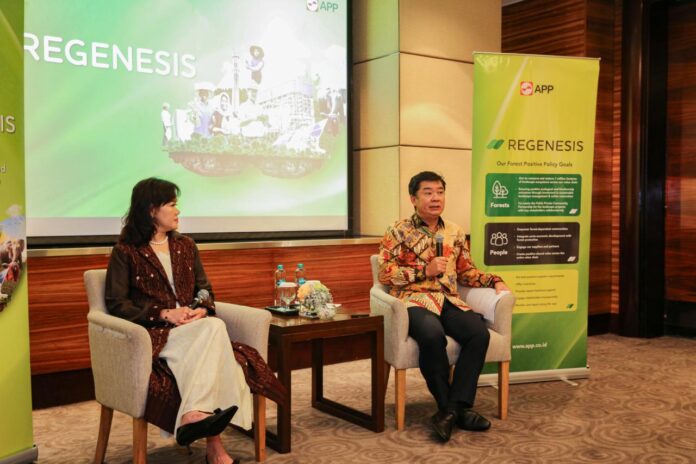Ecobiz.asia — Pulp and paper giant APP Group is preparing several projects within its forestry concessions to enter the voluntary carbon market, aiming to secure conservation funding while providing incentives for local communities.
As a strategic partner, APP is collaborating with Fairatmos, a fast-growing carbon project developer in Indonesia.
“We have several projects in the pipeline that we are preparing together with Fairatmos,” said APP Group Chief Sustainability Officer Elim Sritaba on the sidelines of the launch of the company’s sustainability platform Regenesis in Jakarta, Wednesday (Sept 10, 2025).
Elim did not disclose the locations of the projects or the certification scheme to be used, noting that APP is still reviewing options to align with government policy. “We haven’t decided yet whether we will use Verra, REDD+, or another standard,” she said.
Elim stressed that the company’s primary objective in entering carbon markets is to support conservation and decarbonization. “The carbon market provides one of the offset opportunities for APP’s pulp and paper operations,” she added.
APP currently manages 1.07 million hectares of forestry concessions directly, and partners with a number of suppliers controlling a comparable area.
Through Regenesis, the company has committed US$30 million annually for the next decade to conserve and restore one million hectares of tropical forest in Indonesia.
The program is reinforced by the Forest Positive Policy, which emphasizes three pillars: landscape restoration, community empowerment, and responsible supply chain management.
APP Group’s Sustainability Committee Chairman Bernard Tan said carbon market participation will provide stronger incentives for communities to protect forests. “Even without carbon markets, we will continue our conservation programs. But with additional revenues, it will be easier for communities to participate,” he said.
He added that carbon income could help support sustainable agriculture initiatives that the company is promoting in forest areas.
Bernard also underscored the importance of partnerships with customers pursuing carbon neutrality and NGOs increasingly focused on restoration.
“Carbon markets attract more stakeholders to conservation. The communities we can engage with today are much broader than 10 years ago. We believe the timing is right to take this further,” he said. ***





